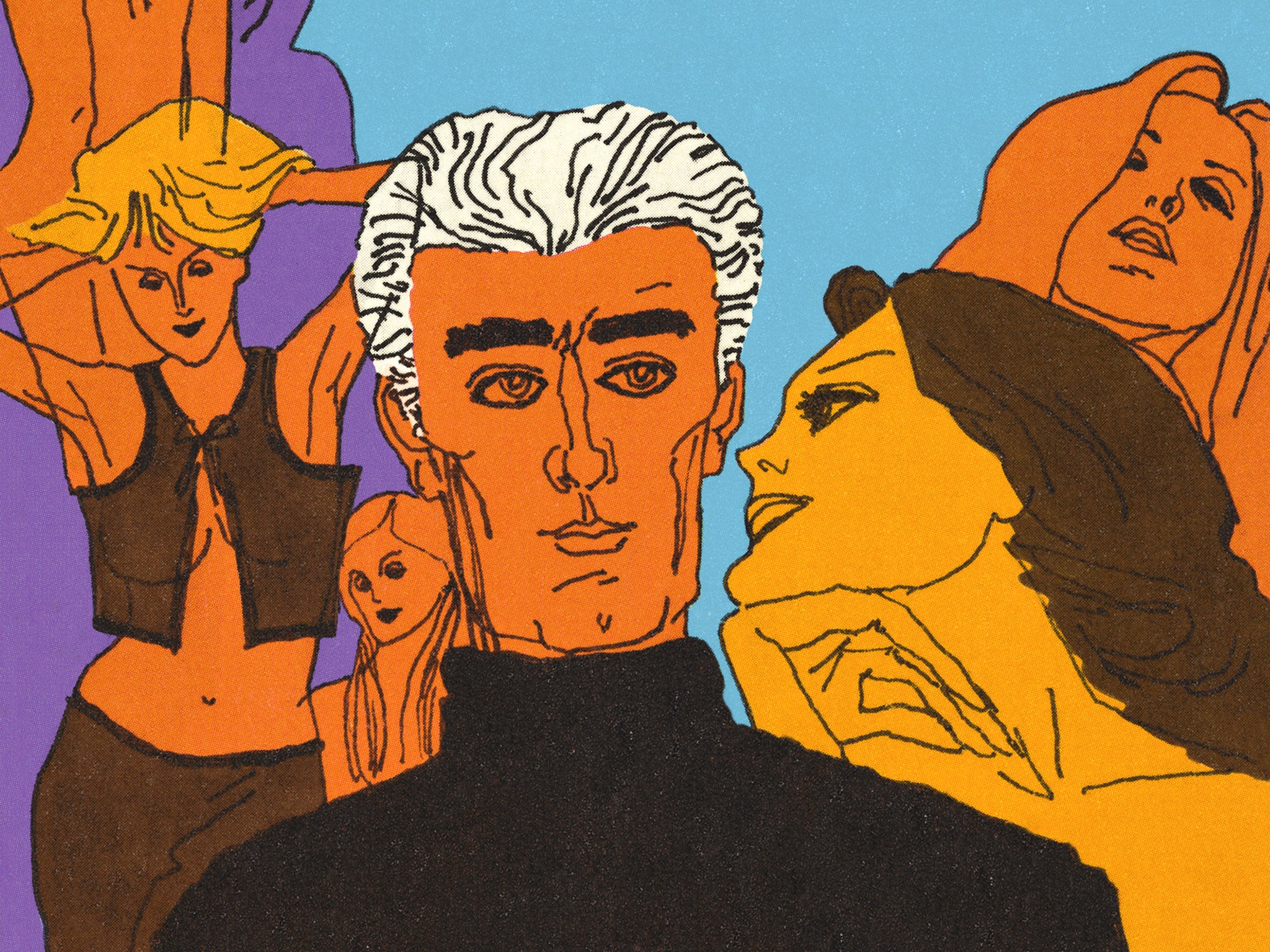Why I’m suspicious of the silver fox
There’s an entitlement around going grey that’s reserved just for men. It cuts to the heart of male privilege, reckons Oliver Keens, in a world where women who go grey are mostly scorned. Isn’t it time to re-evaluate the cliché of the wise, sophisticated and desirable grey-topped gent?


Your support helps us to tell the story
From reproductive rights to climate change to Big Tech, The Independent is on the ground when the story is developing. Whether it's investigating the financials of Elon Musk's pro-Trump PAC or producing our latest documentary, 'The A Word', which shines a light on the American women fighting for reproductive rights, we know how important it is to parse out the facts from the messaging.
At such a critical moment in US history, we need reporters on the ground. Your donation allows us to keep sending journalists to speak to both sides of the story.
The Independent is trusted by Americans across the entire political spectrum. And unlike many other quality news outlets, we choose not to lock Americans out of our reporting and analysis with paywalls. We believe quality journalism should be available to everyone, paid for by those who can afford it.
Your support makes all the difference.I’ve always liked to think of my own hair as an awkward, unruly conflation of my parents’ roots: one from Iran, one from Essex. The sides of my hair are straight, limp and lifeless – in hock to my dad’s fairer, Caucasian hair. Up top, it’s wild and wavy, closer to the Iranian side of my family. Recently, a third party has joined the mayhem: grey hairs, growing at twice the speed of all the rest, bursting out of my head like the springs of a dilapidated mattress. I objectively look like a barn, or Boris in lockdown. Yet society says I look better than ever. I don’t get it.
The classicist Mary Beard has informed much of our discussion around going grey in the past few years, converting the staggering rudeness aimed at her about her own long grey hair into radio and television programmes that have dwelled on why so many women feel compelled to hide the natural process of ageing. While there are a few exceptional and successful women like Beard or Jamie Lee Curtis who feel confident enough to let their grey run free, most women I talk to about it – including my mother, who infused the house with the smell of peroxide from my infancy onwards – say the same thing: women do it because, well, almost all other women do it. As Beard has stated: “Women colour their hair because that’s the only way they see that they can make it in their careers.”
On the flipside however, I’ve never seen a discussion about why most men don’t dye their hair. It’s been more than 75 years since the first over-the-counter hair dye was invented: men have definitely heard of it by now. Colourists exist across the country, dyes are sold in most supermarkets and there is currently no global shortage in hydrogen peroxide. But as I’ve written about before with sex toys and saucy clothes, there’s an unusual gap between what men do and what women do that seldom gets discussed.
I think a lot of men’s self-assuredness around going grey is bound up with the myth of the “silver fox” – a term for an attractive, middle-aged man with a sense of sophistication, maturity and worldly wisdom, categorised by their pigment-less follicles. If you’re attracted to men, you may tire of idiotic, inexperienced cubs but love a smooth-talking and dapper silver fox.
Society by and large loves this narrative. Gone are the days when showy, preening, vain, middle-aged men were tittered about for being victims of the mid-life crisis. No, no, now they’re silver foxes. They’re objects of desire not derision, all basking in the reflective glow of some of the more ambassadorial members of the den: think George Clooney, Jeff Goldblum, even 80-year-old Harrison Ford, who gets his pecs out in the new Indiana Jones film. It doesn’t seem to matter that these totemic, A-list foxes are just conventionally attractive men who have simply got older, that they would still be attractive if they had slept in a pig shed the night before. The mystique and mythology of the wise and ashen-locked older gent – and his attractiveness especially to younger women – is somehow a real thing.
As a middle-aged man who’s also attracted to men, I can kinda see it. A year ago, I was in a soft play area on a weekday morning with my kids, chatting to an intensely good-looking dad as our children made friends and played. Without wishing to conflate soft play with soft porn, he was genuinely one of the sexiest people I’d ever seen: a tanned, wrinkle-less baby-faced man in his late-thirties, with an entirely white head of hair, who looked both tired and bedraggled from parenthood yet still beamed a sense of playful, good-times sexuality from his grey-coiffed barnet and cheeky smile. And they say dads have no fun.
But localised Dilf-spotting aside, I feel it’s a murky business when we so cravenly praise one gender for getting older and reject another at the same time. Nobody wins here, especially when the platitudes go beyond good looks. It’s the deeper aspects of the silver fox myth that make it seem increasingly ridiculous to me, as I get older. Take the idea that grey-haired men are more sophisticated. I mean, yes, compared to their younger selves they’re technically less likely to turn up for a family lunch stoned or accidentally say your flatmate’s name during sex. But the brutal truth about middle-aged male sophistication is that it’s just a synonym for wealth. In reality, middle-aged sophistication mostly begins and ends with the man cave, and a trusty pillow to fart into while watching Sky Sports.
There’s also the idea that grey-haired men carry great intelligence. This is dramatically at odds with the way we mostly view British men in their forties and fifties. More than ever, these are surely the ages when men’s intellects close up and retreat like frightened molluscs, as they become more trenchant and small-mindedly obsessed with what they perceive to be “right” in the world. There’s the myth and there’s the reality, and I honestly reckon that the hot silver fox you saw in Halfords the other week will, in real life, probably just mansplain the Crimean War to you. We want it to be true because what we really crave are men with experience. Men who know a bit about life, men who are sexually confident and emotionally mature. But a 28-year-old that has experienced love, loss and heartbreak is surely a greater catch than a 42-year-old who’s done nothing with his life except go grey and watch endless episodes of Entourage. The silver fox is just another of the many ways we let ourselves be hypnotised by conventionally attractive people. We make mistakes when we project too much onto a man just because he’s pretty – just look at the millions of fans slowly let down by Johnny Depp as the revelations of his private temperament unfolded.

The silver fox at least dispels the damaging and exploitative idea that there’s somehow a crisis in masculinity. Crisis? What crisis, if a saggy-arsed, silver-topped guy in his sixties with a mouth full of tooth decay can somehow be a sex symbol? So-called manfluencers like Jordan Peterson and Andrew Tate ruthlessly pump the line that modern men are in jeopardy, being deprived of paths to take in our new world of equality, and that male roles are all jumbled and confused. It’s seductive stuff, yet empty if you consider the silver fox – a creature who surely could only have been born and nurtured in a patriarchal environment. The paths are open, even if they stay the course, get a job, bang out a couple of kids, do a bit of exercise and survive until they’re 45. Everyone will still think they’re a handsome devil. That is not the stuff of a crisis.
It used to be that the only thing you could buy for a middle-aged man at Christmas was socks. Now you can buy them eye serum or a deep-V T-shirt to show off their weirdly buff dad bod. For this, we should I guess be grateful. But as more silver foxes experience yet another bite out of life’s cherry, whilst silver vixens seem almost non-existent by comparison, maybe it would be more meaningful if we at least start to acknowledge this strange privilege in men’s lives, as well as celebrating it.



Join our commenting forum
Join thought-provoking conversations, follow other Independent readers and see their replies
Comments